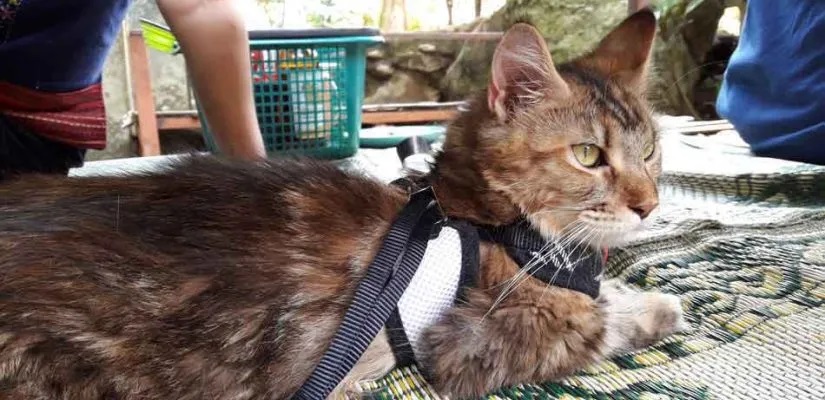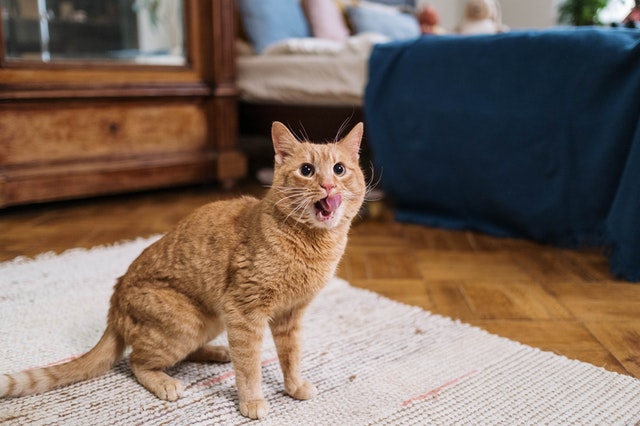If you own a Maine Coon, chances are you’ve experienced the stress of Maine coon spraying. The good thing is that there are many methods you can use to prevent Maine coon cat urine marking and keep your home odor-free.
Maine Coons start spraying when they reach sexual maturity between eight and ten months old. They may start spraying as early as six months of aging in some cases. This makes them more prone to Maine coon urine marking than other breeds of cats, which mature more slowly on average.
What is Cat spraying?

Cat spraying is the act of a male cat spraying strong-smelling urine on walls, furniture, or any other vertical objects.
This behavior is very common in cats, and there are many reasons why they do it:
- Mark their territory
- When they feel afraid
- After going outside the house
- During mating season
- If they have an infection in their urinary
When Do Maine Coons Start Spraying?
Maine Coons Start Spraying at sexual maturity. They may begin spraying as early as six months old in some situations. Maine Coons develop more slowly than other cat breeds, thus they typically begin spraying a few months later.
When Should A Male Maine Coon Cat Be Neutered?
Maine coon neutering happens when the age of the cat is about 4-6 months old. Before a cat reaches the age of four months, it is too small to undergo anesthesia, so it cannot be neutered before I reach that age.
At what age do kittens start spraying?
Maine coon kittens start spraying at the age of four months. Maine coons can attain sexual maturity at the age of four months. Some breeders may neuter their kittens before rehoming them to ensure that the cat owner will not seek to reproduce from the cat.
Why Do Maine Coon Cats Spray?
There are many reasons why they spray. The main reason is because they are territorial animals, and their urine helps them mark their territory as safe from intruders. They will also use this method to stake a claim on an area where there has been a change in ownership or occupancy within the household.
Medical problems
Spraying as a result of medical problems is rare, but it can happen. There are various illnesses and disorders that Maine coon cats might suffer from, which cause them to start spraying urine all over the house or marking specific objects within their territory. Many times these conditions go undiagnosed because there may not be any other symptoms present.
Going on Vacation
The Maine coon cat spraying is also known as the stress response of a Maine coon. When you go out on vacation, they typically feel stressed out because they do not like to be separated from their owners. This can sometimes cause them to start marking objects or places around the house with urine.
Anxiety
Anxiety is the main reason why Maine coon cats spray. In this case, they will typically start after the Maine coon cat has been spayed or neutered because their anxiety levels have been lowered from the procedure itself. Many owners do not take into consideration that when you get your Maine coon cat spayed.
Loneliness
When your Maine coon does not get enough attention, it may feel lonely and vulnerable to attack by other animals within its territory. Then, they will start spraying.
Boredom
Maine coons are intelligent, social cats. Without enough mental and physical enrichment, they may start to misbehave. Bored Maine coons can be destructive or develop behavior problems like spraying – so it’s important to give your Maine coon plenty of toys he can play with on his own!
Stress
Many environmental problems can stress out a Maine coon’s existence, but if you think your Maine coon is spraying due to stress, the source of that tension should be identified.
Reorganization
Small changes in your cat’s environment can feel very big. This can cause them to be stressed. Then, They will begin spraying.
Moving
Moving is a stressful experience for both people and animals. After a move, a cat may become lost or disoriented. In addition to having difficulty finding their way around the new area, after undergoing such an extreme change in environment, they may start spraying.
Wanting to Mate
Maine Coons also reach sexual maturity around eight to ten months, which is when they start wanting to mate. This means that most male and female Maine Coon cats will spray.
Reaction to Other Cats
In the case of multiple cats at home, the Maine Coon may spray to establish dominance and establish its territory.
Marking Territory
Marking Territory by Maine coon cats is a common behavior issue that causes the Maine coons to start spraying.
Also Check: Do Maine Coons Need To Be Groomed?
How to prevent Maine Coons from spraying

Maine coons that start spraying need to receive a diagnosis. There’s more than one reason Maine coons spray, and sometimes it can be because of a medical condition that needs treatment.
Prevention Tips:
- To prevent Maine coon from starting to mark territory inside the house, remove the cat immediately upon seeing any signs that they have started marking.
- Keep the Area Clean: If Maine coon cats are spraying around the house, you will need to clean up after them. Use an enzymatic cleaner on any area that they have sprayed so that it doesn’t smell like their urine or feces.
- Reducing stress in Maine coons is also helpful in reducing spraying. They are more likely to mark when they feel stressed out, so trying to reduce any stressors that your Maine coon may be experiencing can go a long way toward stopping them from marking their territory inside the house.
- Provide a space for your cat to go if they need to feel secure. A cat tree or scratching post is perfect for Maine coons that want to climb and scratch, especially when you’re not around.
- Neutering Maine coons is also an effective way of stopping them from spraying. If Maine coon cats are neutered at the right time, they typically stop marking territory within weeks or months after surgery.
- Relief their anxiety: Maine coons that feel stressed out may start marking territory. Try to take them on frequent trips outside, and spend as much time with them as possible if they seem anxious or depressed. You can also try using a Feliway spray to help calm Maine coon cats down so that spraying will decrease significantly in frequency.
How do you stop a neutered maine coon cat from spraying?
There are seven ways to prevent your Maine coon cat from spraying.
Your cat should be neutered. Although desexed cats can still spray, neutering them will assist in reducing this behavior.
- Determine the source of your stress.
- Examine their living quarters.
- Maintain your cat’s activity level.
- Maintain an optimistic attitude.
- Use a soothing collar, spray, diffuser, or dietary supplement to help you relax.
- Make an appointment with your veterinarian.
Can cats spray at four months?
Spraying usually begins when cats are 6 to 7 months old, while male cats can attain maturity as early as 4 to 5 months. You should pay attention to spraying behavior because very young cats are often pregnant.
Do female cats spray?
Cats also use urine as a scent indicator to identify their territory. Spraying is a term that distinguishes itself from a one-time mistake or toileting. Females and male Maine coons both sprays, and it usually takes place outside.
How do You know if your cat is spraying?
A spraying cat will have its tail straight up in the air and will project its back at the target. It’s possible that the tail will tremble or quiver. A spraying cat will normally just mark with pee and will continue to use the litter box on a regular basis. It’s unusual for a cat to leave a mark in the form of feces.
Conclusion
Maine Coons are not known for their spraying, but sometimes they do start.
If you’re worried about your cat starting to spray, then read on and find out what might cause it.
Our advice is that if the problem persists after all these steps have been taken, contact an animal behaviorist or vet who will be able to offer more help.